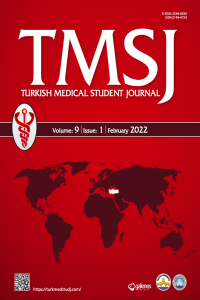HEAVY WORKLOAD OF NURSES AND EFFECTS OF IT ON SLEEP/RESTED LEVELS
HEAVY WORKLOAD OF NURSES AND EFFECTS OF IT ON SLEEP/RESTED LEVELS
Nurse, sleep disorders, work load,
- ISSN: 2148-4724
- Başlangıç: 2014
- Yayıncı: Trakya Üniversitesi
HEAVY WORKLOAD OF NURSES AND EFFECTS OF IT ON SLEEP/RESTED LEVELS
Doruk Yaylak, Betül Çalışgan, Tuğçem Karakaş, Özge Mert, Ceren Öncel, Ozan Köse, Zerrin Gökçe Yücel, Volkan İnal
DOES PATIENT MORTALITY INCREASE WITH LOW ALBUMIN LEVELS IN SEPTIC SHOCK?
Oktay Dokuz, Büşra Betül Balcı, Büşra Bilgiç, Oğuz Yaprak
CASE SPECIFIC AUTOPSY PROCESS OF CORPSES PULLED OUT OF WATER
Doruk Yaylak, Büşra Oflaz, Ahmet Yılmaz
THE RELATION BETWEEN REGULATION OF BLOOD SUGAR IN SEPSIS AND PATIENT MORTALITY
Şeyda Ece Sarıbaş, Metehan Pehlivan, Neşe Ulusoy
THE EFFECT OF OCCUPATIONAL GROUPS AND USE OF ALCOHOL AND SMOKING IN THRACE ON SEMEN PARAMETERS
Tuğba Gül, Gizem Yılmaz, Seda Bayram, Zehra Nihal Dolgun, Sevinç Ege
RELATIONSHIP BETWEEN DAILY CALORIE SUPPORT AND OUTCOME OF THE PATIENTS WITH SEPSIS IN INTENSIVE CARE
Büşra Betül Balcı, Büşra Bilgiç, Metehan Pehlivan, Neşe Ulusoy, Oğuz Yaprak
CONTRIBUTION OF LONG TERM VIDEO EEG MONITORING TO DIAGNOSIS OF EPILEPSY PATIENTS
Hümeyra DEMİRKIRAN, Gizem Kaymak, Ecem Küçükyörük, Elif Boncukçu, Gökçe Betbaşı, Neçirvan Çağdaş Çaltek, Babürhan Güldiken
